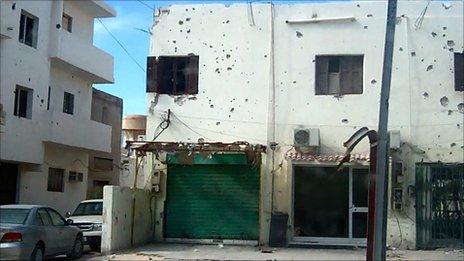Libya in limbo as pressure starts to tell
- Published

A stern-looking poster of Col Muammar Gaddafi, fist clenched, marks the start of Libyan territory after crossing from Tunisia.
"Welcome to Libya," says a plain-clothes official with a sarcastic laugh. "Here you don't have to worry about nothing."
A handgun pokes out from under his shirt.
But the uniformed guards at the Ras Jdir border point were relaxed and joking as they gave our bags a cursory search, leaving most of them unopened.
Just months ago, this same frontier was overwhelmed by fleeing refugees - many are still camped out in tent villages along the road inside Tunisia.
On this day the traffic was light, and there was none of the edginess and tension you might expect on the frontier of a country at war.
A line of cars were waiting to leave Libya, many of them containing families with children.
Most looked like they were going for short trips or to stock up on supplies; only a few vehicles were filled with belongings suggesting they would be away for longer.
Angry drivers
But even here there were signs that the pressure on Libya is starting to tell, two months into the Nato bombing campaign.
Coming in from Tunisia were pick-up trucks filled with small motorbikes and mopeds. There were others carrying stacks of boxed-up bicycles.
We saw more on the road as we headed towards Tripoli in the bus provided by the Libyan government, a minder keeping an eye on us.
Petrol is fast running out, which has prompted Libyans to find other means of transport. Sales of small motorbikes, mopeds and bicycles are booming.
The motorbikes and mopeds use diesel, which for the moment is still available. But at every petrol station we passed there were long queues, stretching several blocks and two or three cars wide.
The petrol stations themselves are closed. People are staying in the line to save their place in case a delivery eventually comes.
If the shortages get worse, the parts of Libya still controlled by Col Gaddafi could come to a halt.
A scuffle had just broken out among frustrated drivers as we approached one vast petrol queue halfway to Tripoli, where the waiting cars had spread to both sides of the road.
A plain-clothes official wielding a long baton was trying to restore order. Angry drivers shouted from the sidelines.
Checkpoints
The strain is growing, even though the security apparatus retains its grip in the coastal region around Tripoli.
Buildings bear the scars of heavy fighting in some towns we pass through, but Col Gaddafi's forces regained control here weeks ago.
Just to the south, however, they have been pushed back by rebels from the western mountains, losing control of the Dehiba border point, the other main crossing to Tunisia.
On the coastal road, the security forces are maintaining a highly visible presence, with armed checkpoints every few miles.
There are reports that they are checking people's mobile phones for evidence of pro-rebel propaganda.
Only our government bus was waved through without being stopped.
But there is a sense of a country in limbo, waiting for something to happen. Some shops are open but many more are shuttered.
Col Gaddafi is a past master at defying international pressure. But things could still change quickly.